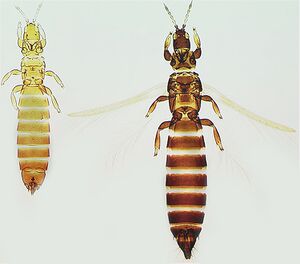Difference between revisions of "Limothrips cerealium"
m (Protected "Limothrips cerealium" ([edit=sysop] (indefinite) [move=sysop] (indefinite))) |
|||
| (10 intermediate revisions by one other user not shown) | |||
| Line 1: | Line 1: | ||
| + | [[File: Limothrips cerealium male and female.jpg|thumb|right|Male and female]] | ||
== Nomenclatural details == | == Nomenclatural details == | ||
| + | ''Thrips (Limothrips) cerealium'' Haliday, 1836: 445. | ||
| + | |||
| + | ''Limothrips avenae'' Hinds, 1902: 139. | ||
| + | |||
| + | ''Limothrips aptera'' Karny, 1914: 56. | ||
| + | |||
| + | ''Limothrips minor'' Bagnall, 1927: 565. | ||
| + | |||
| + | ''Limothrips adusta'' Maltbaek, 1927: 14. | ||
| + | |||
| + | ''Limothrips cerealium ssp. astutus'' Priesner, 1964: 115. Synonym for ''T. (Limothrips) cerealium''. | ||
| + | |||
| + | ''Limothrips syriacus'' Jenser, 2009: 83. | ||
| + | |||
== Biology and Distribution == | == Biology and Distribution == | ||
| + | Described from England (''T. cerealium''), Syria (''L. syriacus''), Denmark (''L. adusta''), Sardinia, Italy (''L. minor, L. aptera''), Cyprus (''L. astutus'') and Massachusetts USA (''L. avenae''). | ||
| + | |||
== References == | == References == | ||
| + | Haliday AH (1836) An epitome of the British genera in the Order Thysanoptera with indications of a few of the species. ''Entomological Magazine'' 3: 439–451. | ||
| + | |||
| + | Karny H (1914) Beitrag zur Thysanopterenfauna des Mediterrangebietes. ''Verhandlungen der Zoologische Botanisches Gesellschaft'' 64: 50–60. | ||
| + | |||
| + | Maltbaek (1927) ''Haderslev Katedralskoles Aarskrift''. 1927: VI, XIV. | ||
| + | |||
| + | Bagnall RS (1927) Contributions towards a knowledge of the European Thysanoptera II. ''Annals and Magazine of Natural History'' (9)19: 564–575. | ||
| + | |||
| + | Mound LA & Palmer JM (1974) Notes on Thysanoptera from Israel. ''Entomologist's Monthly Magazine'' 109: 102–106. | ||
| + | |||
| + | Jenser G (2009) New Thysanoptera species from Syria, with descriptions of ''Limothrips syriacus'' sp.n. (Thripidae). ''Folia Entomologica Hungarica'' 70: 81–85. | ||
| + | |||
== Type information == | == Type information == | ||
| + | Holotype (''L. syriacus''), Hungarian Natural History Museum, Budapest. | ||
| + | |||
| + | Syntype (''L. avenae''), National Museum of Natural History, Smithsonian Institution, Washington DC. | ||
| + | |||
| + | Syntype (''L. minor''), The Natural History Museum, London. | ||
| + | |||
| + | [[category: Limothrips species]][[category: Thripinae species]][[category:Thysanoptera species extant]] | ||
Latest revision as of 07:15, 18 September 2015
Nomenclatural details
Thrips (Limothrips) cerealium Haliday, 1836: 445.
Limothrips avenae Hinds, 1902: 139.
Limothrips aptera Karny, 1914: 56.
Limothrips minor Bagnall, 1927: 565.
Limothrips adusta Maltbaek, 1927: 14.
Limothrips cerealium ssp. astutus Priesner, 1964: 115. Synonym for T. (Limothrips) cerealium.
Limothrips syriacus Jenser, 2009: 83.
Biology and Distribution
Described from England (T. cerealium), Syria (L. syriacus), Denmark (L. adusta), Sardinia, Italy (L. minor, L. aptera), Cyprus (L. astutus) and Massachusetts USA (L. avenae).
References
Haliday AH (1836) An epitome of the British genera in the Order Thysanoptera with indications of a few of the species. Entomological Magazine 3: 439–451.
Karny H (1914) Beitrag zur Thysanopterenfauna des Mediterrangebietes. Verhandlungen der Zoologische Botanisches Gesellschaft 64: 50–60.
Maltbaek (1927) Haderslev Katedralskoles Aarskrift. 1927: VI, XIV.
Bagnall RS (1927) Contributions towards a knowledge of the European Thysanoptera II. Annals and Magazine of Natural History (9)19: 564–575.
Mound LA & Palmer JM (1974) Notes on Thysanoptera from Israel. Entomologist's Monthly Magazine 109: 102–106.
Jenser G (2009) New Thysanoptera species from Syria, with descriptions of Limothrips syriacus sp.n. (Thripidae). Folia Entomologica Hungarica 70: 81–85.
Type information
Holotype (L. syriacus), Hungarian Natural History Museum, Budapest.
Syntype (L. avenae), National Museum of Natural History, Smithsonian Institution, Washington DC.
Syntype (L. minor), The Natural History Museum, London.
